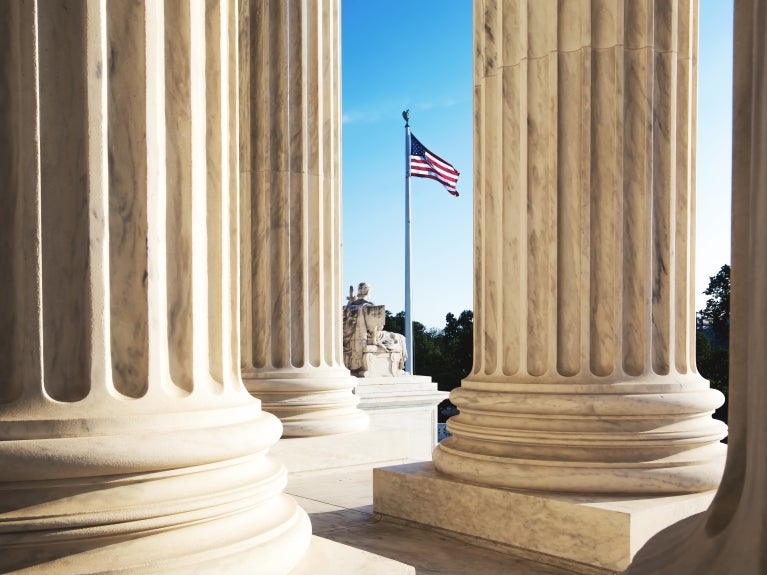Remote Proceeding Tracker

In response to COVID-19, courts were forced to adapt to the pandemic and adopt new rules regarding in-person and remote proceedings.
The list below contains links to each state's laws and rules related to remote proceedings. Jurisdictions vary on which proceedings may be remote or in person, and this list should serve as a starting point when researching whether a proceeding may be remote or in person and what rules and other guidelines apply to that proceeding. The list will be updated periodically and subject to change to reflect the various states' changes to their remote proceeding rules and guidelines as those states begin to transition out of the pandemic.
| Remote Proceeding Tracker | ||
| State | Remote Proceeding Rules | Additional information |
| Alabama | A COVID-19 (10-25-2022) order still appears to be in effect allowing a judge to permit remote appearances, proceedings, hearings, or review in which testimony is not given by audio/video means. | There is nothing to indicate that this order has been repealed or superseded. |
| Alaska | Order No. 2012 contains a list of civil and criminal proceedings that may be done remotely or are presumptively in-person. | |
| Arizona | AO 2022-88 contains a list of recommendations for whether a hearing or proceeding should be remote or in person. | The list was created by a workgroup as part of a report to recommend in-person versus remote hearings post pandemic. These are considered presumptive standards. |
| Arkansas | Rule 88 of the Arkansas Rules of Civil Procedure contains rules for virtual and blended proceedings. The court has discretion as to whether a proceeding will be virtual or blended. | Note that for jury trials, only specific witnesses and the court reporter may be virtual. |
| California | Rule 3.672 of the Rules of the Court provides the court discretion to hold hearings remotely for civil proceedings. | See also Code of Civil Procedure section 367.75 for additional rules. |
| Colorado | The Virtual Proceeding Policy contains a list of presumptively in-person and "flexible" appearances. However, courts have discretion to allow remote appearances if good cause is shown (a list of such instances is in the link). | |
| Connecticut | Sec. 23-68 of the Connecticut Practice Book permits upon motion and at the discretion of the court, any party, counsel or witness or other witness to appear via interactive audio-visual device in any civil matter. | |
| Delaware | Guidelines and expectations for remote hearings in the Court of Chancery; these are not law and do not state which proceedings should be remote. | Rule 173c states that "The Court may, upon the request of any party or sua sponte, direct that any argument or hearing be held by means of remote communication in whole or in part. The Court may make such orders regarding appearance of counsel, parties and witnesses by remote communication as it shall deem appropriate." |
| Florida | Order SC21-990 amends several rules of procedure and allows for certain types of remote hearings and appearances. | |
| Georgia | The supreme court modified rules 9.1 and 9.2 to allow remote hearings for both civil and criminal proceedings. The rules lay out a nonexhaustive list of generally permissible types of hearings. Note that certain criminal proceedings are required to be conducted in person. | |
| Hawaii | Testimony was offered to legislature regarding adding another judicial district that notes that remote hearings take longer and use extra resources but will still be an option "for most proceedings" in district courts. | Each judicial circuit has its own set of rules: First, Second, and Fifth. |
| Idaho | ***CURRENTLY IN AN ASSESSMENT PERIOD*** Other than jury trials, any rule prohibiting a remote proceeding is suspended and subject to court approval. Certain types of proceedings must remain in person per the order. | Idaho Rule of Civil Procedure 7.1 gives discretion to the court to hold hearings via telephone or teleconference in the following situations: (1) any motion, except motions for summary judgment, unless the parties stipulate to allow a summary judgment motion to be heard by telephone or video teleconference; (2) any evidentiary hearing, when no oral testimony is to be introduced at the hearing, except the court may allow testimony by video teleconference if the parties stipulate; or (3) any other pretrial matter. |
| Illinois | Supreme Court Rule 45 generally allows "court participants" to appear remotely in certain civil and criminal circuit court proceedings at the discretion of the judge. | |
| Indiana | The supreme court issued Interim Rule 14 which allows for remote proceedings subject to the court's discretion. Note that there is a distinction between testimonial and nontestimonial proceedings. In testimonial proceedings, the proceeding will be in person unless good cause is shown to allow some of the participants to appear remotely. | See also Rule 14 which notes that the court may supersede this rule. |
| Iowa | Iowa Rule of Remote Procedure—In-person proceedings are presumptive. For civil matters, remote proceedings may be made by motion or by the court. The court may grant the motion based on a list of factors in the rule. The rules differ for criminal, juvenile, and family law proceedings. | |
| Kansas | List of recommendations for types of hearings that should be remote as well as a list of existing rules and statutes governing remote hearings. | These are recommendations from the Kansas Judicial Branch Videoconferencing Committee as appointed by the Kansas Supreme Court. It's not clear whether these recommendations have been adopted. |
| Kentucky | COVID-19 order (03-22-2022) in place encouraging remote hearings and proceedings to continue. | There is nothing to indicate that this Order has been repealed or superseded. Note that some judicial districts have their own remote proceeding rules: 24th Judicial District and 50th Judicial District. |
| Louisiana | Rule 3.5 allows appearance of a party or witness with permission of the court. | |
| Maine | Order allows presumptive remote proceedings (pretrial conferences, discovery status conferences, and a few others). All other proceedings are presumptively in person. The court may order a proceeding to be conducted remotely. A party may file a motion to appear remotely and the court may grant it for good cause. | |
| Maryland | Rule 21-201 generally governs permissible remote electronic participation in civil proceedings. | See also Remote Hearings Guidelines and Title 21 Remote Electronic Participation in Judicial Proceeding. |
| Massachusetts | Virtual Proceeding rules in light of the COVID-19 pandemic were rescinded effective January 1, 2024. | The court has published information, available here, for virtual / remote services. |
| Michigan | Remote proceedings generally allowable per R. 2.408 in civil matters with some exceptions. The rules use the term "videoconferencing" to describe remote proceedings. | |
| Minnesota | Judicial Council Policy 525 lays out which hearings should generally be presumed to be remote, in person, or hybrid. | See Order which provides district courts factor to consider when assessing whether to allow parties to appear remotely or in person depending on the hearing type. |
| Mississippi | COVID-19 order (12-30-2021) which appears to be in effect gives judges discretion on whether to allow remote proceedings. | There is nothing to indicate that this order has been repealed or superseded. |
| Missouri | No guidelines found. | |
| Montana | COVID-19 order (05-17-2021) states that courts may continue using remote hearing or telephonic hearings for cases. | There is nothing to indicate that this order has been repealed or superseded. Note that some court's local rules permit remote appearances at the discretion of the court. See here for example. |
| Nebraska | Remote proceeding rules vary by district. See link for district-specific rules. | |
| Nevada | Supreme court rules IX-A and IX-B allow civil and criminal courts the use of "telephonic transmission equipment" to allow parties to appear remotely for certain proceedings. | |
| New Hampshire | For the superior court, some proceedings are presumptively remote while others require leave of court. | For the circuit court, see link for list of presumptive remote hearings. |
| New Jersey | Order generally calls for proceedings to be in person, but they may be held remotely at the discretion of the court. | |
| New Mexico | Each district has its own plan for remote hearings. The list of districts may be accessed here. | |
| New York | Section 202.70 Rule 1(d) generally allows counsel to appear remotely for court conferences and oral arguments of motions at the court's discretion. These rules apply to the commercial division of the supreme court. | |
| North Carolina | N.C. Gen. Stat. § 7A-49.6 generally allows parties to be present via audio and video transmission for all proceedings with some conditions. | |
| North Dakota | Supreme Court Administrative Rule 52 generally allows parties to conduct most proceedings remotely by "reliable electronic means." Trials in civil actions require party consent and court approval. Criminal trials have some conditions as well. | |
| Ohio | Remote proceedings allowed in civil matters at the discretion of the court in the case of trial. | See Rules 1.1 (definitions), 39(b) (remote trials) and Rule 43 (remote testimony). |
| Oklahoma | Title 12, Chapter 2, Appendix, Rule 34 sets out the rules for allowing videoconferencing for certain types of proceedings in the district court at the discretion of the court. | |
| Oregon | Generally allowable per order permitting remote proceedings at the discretion of the court. | |
| Pennsylvania | Notice from the Commonwealth Court allows remote appearances for those who may have COVID-19 or live in a household with someone who is at risk. Hearings and oral arguments before the Commonwealth Court may be done remotely. | There are taskforce recommendations, but they were not adopted and further attempts at adoption have not been made. Note that some local courts have adopted their own set of remote rules. |
| Rhode Island | Administrative order governs which types of proceedings may be conducted remotely. | |
| South Carolina | Order allows remote communication technology for certain proceedings generally at discretion of the court. | |
| South Dakota | Remote proceedings generally allowed in civil actions by the court's own motion or by a party's motion. Trials may be conducted remotely if the court approves and the parties consent. | |
| Tennessee | Per Supreme Court Rule 55, use of teleconferencing, video conferencing or other technology to conduct court proceedings or other court business remotely is permissible at the discretion of the trial or appellate court. | |
| Texas | Per Rule 21 of the Rules of Civil Procedure, remote proceedings are allowable but only upon sufficient notice and consent by the court. Note that remote proceedings may not be compelled if oral testimony is being given (unless by agreement of the parties or good cause) or in the case of a jury trial, and only by agreement between the parties. The rule lists several factors for determine good cause. | |
| Utah | Judges have discretion to allow parties, attorneys, or witnesses to appear remotely. Certain requirements must be met but the judge may require a physical presence even if the requirements are met. | Motions may be heard remotely as well as testimony. |
| Vermont | Rule 43.1 regarding remote and hybrid proceedings states that all proceedings will be scheduled in person unless otherwise ordered pursuant to the rule. | See link for technical standards for remote and hybrid proceedings. |
| Virginia | Note that there are some rules which allow proceedings to be carried out remotely, via telephone or videoconference such as Rule 1:27, allowing for remote testimony in certain circuit court civil proceedings and Rule 1:19 allowing for pretrial conferences to be conducted by videoconference. | Note that certain individual courts may allow for remote hearings based on their own local rules. |
| Washington | Per order, the court generally has authority to conduct civil proceedings remotely. | See index which lists which courts will have virtual proceedings. |
| West Virginia | Under Trial Court Rule 14.02 per the trial court rules, videoconferencing may be used in evidentiary and non-evidentiary proceedings as well as allowing witnesses to testify. | Note that there is information for joining remote hearings via Skype or Teams. |
| Wisconsin | Permitted at discretion of court per Rules 885.50 - 885.64. | See also the court's webpage for appearing remotely. |
| Wyoming | Rule 43 allows remote testimony of witnesses in open court. | |

